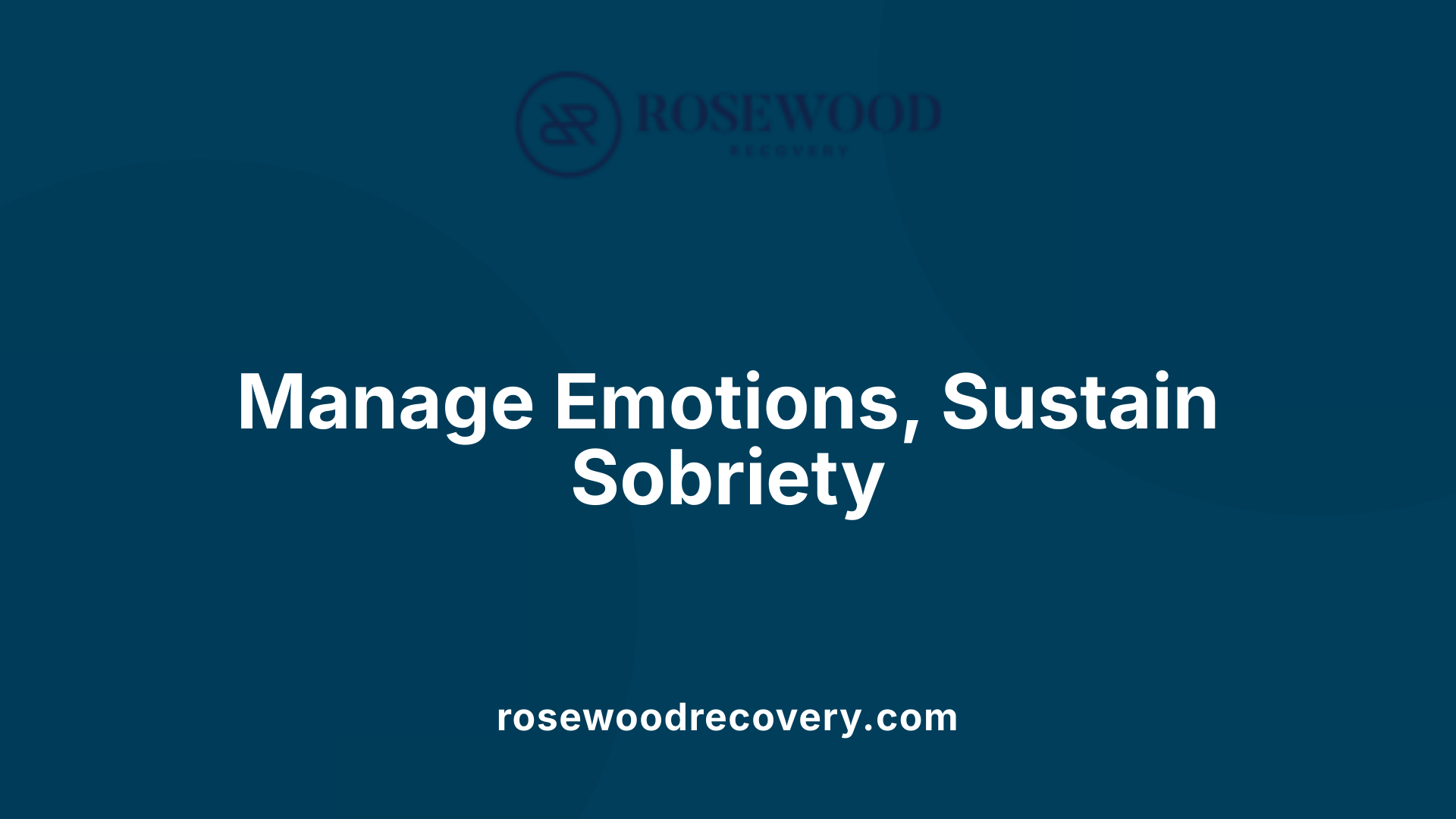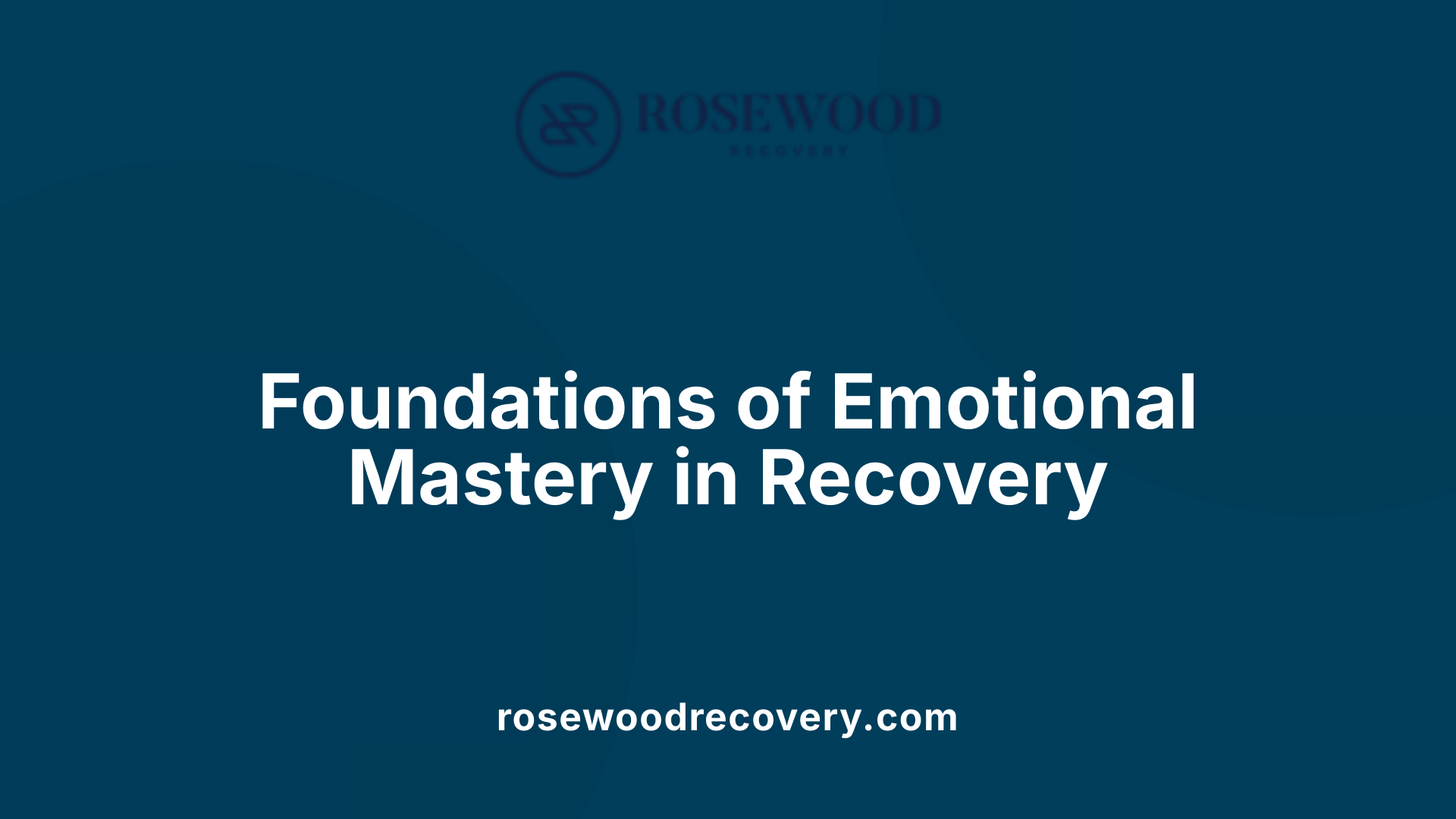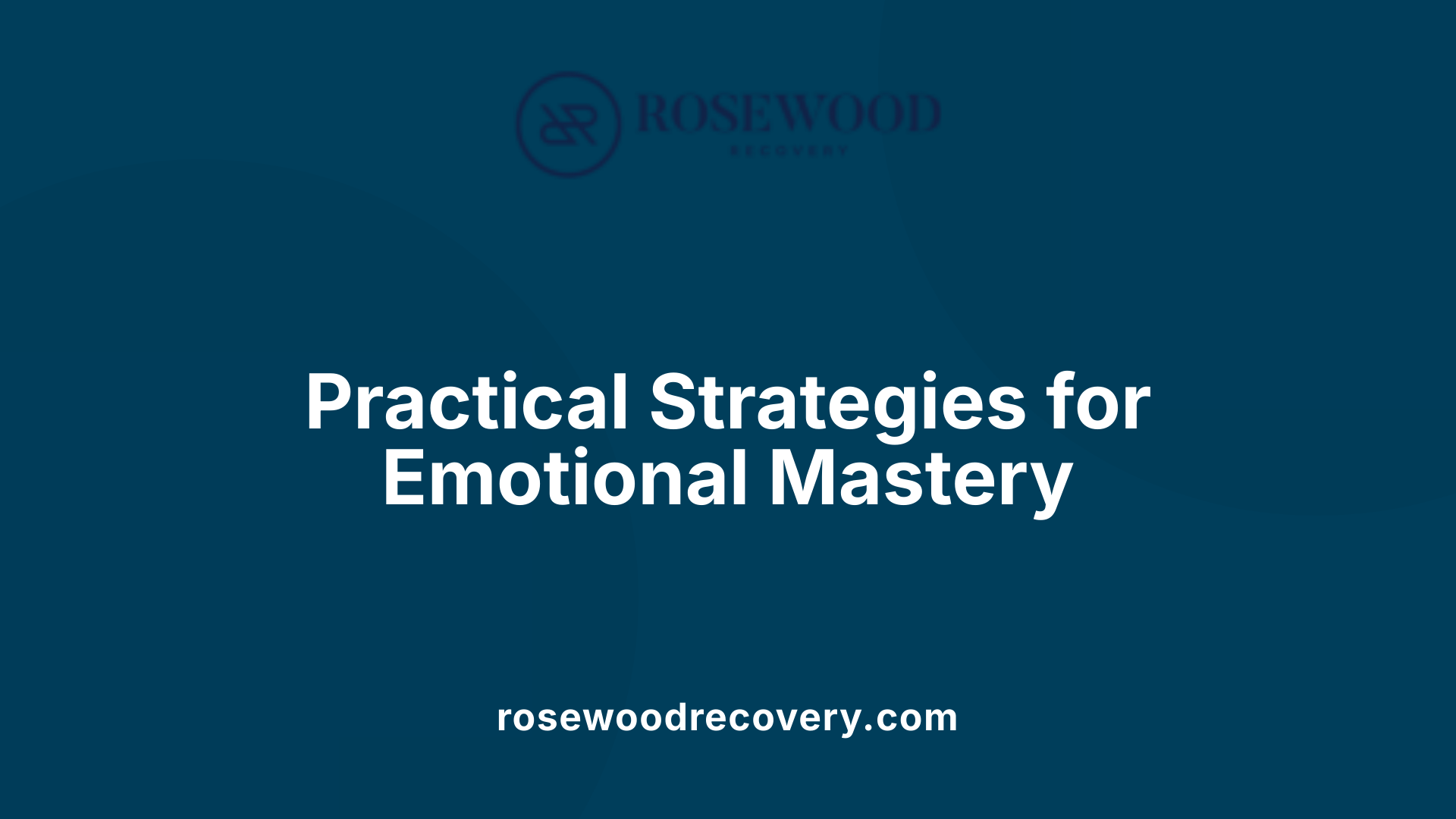The Critical Role of Emotions and Emotional Intelligence in Addiction Recovery
Long-term addiction recovery is a complex journey that requires more than physical detox and initial treatment. Central to sustaining sobriety is emotional mastery—the ability to understand, regulate, and harness emotions to foster resilience, healthy relationships, and psychological well-being. This article explores why emotional mastery is fundamental in addiction recovery, highlighting its scientific and philosophical foundations, and providing practical strategies to develop emotional intelligence that supports enduring sobriety.
The Significance of Emotions in Addiction Recovery

Why are emotions important in recovery?
Emotions play a vital role in addiction recovery because addiction itself often stems from an attempt to escape painful or overwhelming feelings. Many individuals turn to substances as a way to numb or avoid emotions such as sadness, anger, guilt, or anxiety. Managing these emotions effectively is crucial for maintaining sobriety.
Developing emotional awareness involves recognizing these feelings, accepting them without judgment, and learning healthy ways to process them. Techniques such as mindfulness, physical activity, journaling, or seeking support from others can help manage stress and adverse emotions.
Building emotional stability contributes to mental health resilience and fosters meaningful relationships. This emotional foundation supports long-term recovery by reducing the likelihood of relapse triggered by unmanaged feelings.
In addition to coping strategies, cultivating emotional sobriety—learning to experience feelings authentically without escape—shifts focus from controlling substances to emotional growth and healing. Such development enhances self-awareness and decision-making, which are essential for sustained well-being and sobriety.
Ultimately, understanding and actively managing emotions through emotional intelligence fosters a balanced, healthy mental state, enabling individuals to navigate life's challenges with resilience and confidence.
How do emotions influence behavior and relapse?
Emotions influence behavior profoundly, especially in individuals recovering from addiction. Negative feelings like anger, guilt, sadness, or anxiety can create intense urges to relapse if not properly managed.
Emotional dysregulation—when people experience strong, unmanageable emotions—can lead to impulsive decisions, including returning to substance use as a coping mechanism. This pattern makes relapse more likely when feelings become overwhelming and unresolved.
Research shows that poor emotional regulation is linked to higher susceptibility to substance use disorders because individuals may seek immediate relief from distressing feelings. Conversely, effective emotional regulation allows for healthier responses, reducing impulsivity and improving impulse control.
Therapies like Cognitive Behavioral Therapy (CBT) and Dialectical Behavior Therapy (DBT) teach skills to recognize, understand, and regulate emotions. Mindfulness practices cultivate present-moment awareness, helping individuals respond thoughtfully rather than reacting impulsively.
By learning to manage emotions, recovering persons can address triggers early, prevent escalation, and build resilience against relapse.
The role of emotional stability in mental health and sobriety
Emotional stability is foundational in maintaining both mental health and sobriety. Stable emotions promote clearer thinking, better decision-making, and healthier interpersonal relationships.
In the context of addiction recovery, emotional stability reduces vulnerability to emotional upheavals that often lead to relapse. It supports developing routines that help manage stress, improve mood, and handle life's challenges.
Building this stability involves practicing emotional regulation, cultivating self-awareness, and fostering empathic relationships. Support systems, therapy, and mindfulness practices all contribute to strengthening emotional resilience.
Furthermore, emotional stability enhances overall mental well-being by decreasing symptoms of anxiety, depression, and mood swings that can impair recovery efforts.
Research indicates that higher emotional intelligence correlates with greater emotional stability, which in turn facilitates sustained sobriety. It empowers individuals to respond adaptively to stressors and setbacks, ensuring they stay committed to their recovery journey.
By prioritizing emotional health as part of comprehensive addiction treatment, individuals create a sustainable foundation for lifelong sobriety and mental wellness.
| Aspect | Focus | Supporting Details |
|---|---|---|
| Emotional Importance | Why emotions matter | Emotions drive actions, can trigger relapse if not managed, and are central to recovery success |
| Influence on Behavior | How emotions affect actions | Negative feelings can lead to impulsivity; emotional dysregulation increases relapse risk |
| Emotional Stability | Its role in health | Promotes mental clarity, better decision-making, and stronger relationships, supporting long-term sobriety |
This integrated understanding highlights how essential emotional intelligence and regulation are for ongoing recovery, emphasizing the need for therapeutic interventions and self-care strategies to foster emotional resilience.
Understanding Emotional Mastery: Its Foundations and Impact

What are the scientific and philosophical foundations of emotional mastery relevant to addiction recovery?
The concept of emotional mastery in addiction recovery is deeply rooted in both scientific research and philosophical understanding. Scientifically, the foundation is built upon the field of emotional intelligence (EI), which emphasizes the ability to recognize, understand, and manage emotions. Psychologists like Mayer and Salovey defined EI as the ability to monitor, discriminate, and use feelings and emotions to guide thinking and actions. Broadening this, neuroscientific studies reveal that emotional dysregulation—characterized by difficulty managing emotional responses—is often linked to the development and persistence of addiction.
Neuroscience shows that emotional dysregulation involves impairments in brain regions responsible for decision-making and impulse control, such as the prefrontal cortex and amygdala. These areas become less effective when emotions are overwhelming, increasing vulnerability to substance use as a form of self-medication. Developing emotional mastery helps restore the function of these brain circuits, promoting healthier responses and resilience.
From a philosophical perspective, the foundations emphasize personal agency and autonomy. Theories of emotional mastery advocate for individuals taking control of their emotional life, fostering authentic decision-making aligned with their values and goals. Philosophers like Aristotle highlighted the importance of virtues such as self-control and temperance, which underpin emotional regulation. In the context of addiction, this philosophical outlook encourages individuals to recuperate their agency, resisting compulsive behaviors through autonomous and deliberate choices.
Overall, these scientific and philosophical principles converge to demonstrate that cultivating emotional mastery provides essential tools for managing triggers, rebuilding relationships, and maintaining sobriety, making it a cornerstone of effective recovery.
The Role of Therapy in Building Emotional Skills
How can developing emotional regulation skills enhance recovery outcomes?
Building emotional regulation skills is essential for effective addiction recovery. These skills empower individuals to manage difficult feelings such as anger, guilt, or stress without resorting to substances. When emotional responses are controlled, impulsive behaviors decrease, which directly impacts relapse prevention.
Therapeutic approaches like Dialectical Behavior Therapy (DBT) and Cognitive Behavioral Therapy (CBT) are particularly effective. They teach clients to recognize emotional triggers, employ mindfulness techniques, and develop healthier responses to emotional distress. For instance, mindfulness exercises help individuals stay present and accept their feelings without judgment, fostering emotional balance.
Additionally, engaging in activities such as physical exercise, creative pursuits, or grounding techniques can serve as healthy outlets for emotions. These approaches contribute to resilience, enabling individuals to handle setbacks more constructively.
Research demonstrates that improved emotional regulation correlates with longer periods of abstinence and better mental health outcomes. Overall, strengthening these skills transforms emotional responses from reactive and overwhelming to balanced and thoughtful, supporting sustained sobriety.
| Skill Aspect | Therapeutic Technique | Benefits | Additional Notes |
|---|---|---|---|
| Emotional Awareness | Therapy sessions, journaling | Recognizing emotional triggers | Builds self-awareness, foundational for regulation |
| Regulation Strategies | Mindfulness, CBT, DBT | Managing stress, cravings | Reduces impulsivity, promotes healthy decision-making |
| Resilience Building | Hobbies, physical activity | Handling setbacks | Supports emotional stability and well-being |
Developing emotional regulation is, therefore, a cornerstone of holistic addiction treatment, bridging emotional health and sobriety success.
What role does group therapy play in developing emotional intelligence?
Group therapy offers a unique environment to cultivate emotional intelligence by emphasizing social skills and empathy development. It provides a platform for individuals to share experiences, observe others, and practice emotional responses in a safe space.
In these settings, participants learn core social skills such as active listening, assertiveness, and conflict resolution. For example, providing and receiving constructive feedback enhances self-awareness and empathy—key components of emotional intelligence.
Engaging in group discussions helps uncover unconscious emotional patterns and builds the ability to interpret nonverbal cues—important for effective communication. Participants also learn to understand others’ feelings better, which deepens empathy.
Support from peers fosters a sense of connection, reduces feelings of isolation, and boosts motivation. These elements collectively reinforce emotional regulation and social competence.
Moreover, group therapy encourages practice in real-life scenarios, strengthening interpersonal relationships outside of the sessions. This ongoing practice is vital for creating supportive recovery networks and maintaining long-term sobriety.
| Aspect | Group Therapy Element | Impact | Additional Insights |
|---|---|---|---|
| Empathy Development | Sharing personal stories | Understanding others’ feelings | Cultivates compassion and understanding |
| Social Skills Practice | Role-playing, feedback | Effective communication | Builds confidence in social interactions |
| Support Building | Peer encouragement | Reduces loneliness | Enhances motivation and resilience |
Overall, group therapy is instrumental not only in teaching emotional skills but also in creating a community that sustains recovery efforts longer-term.
Practices and Strategies for Cultivating Emotional Mastery

What strategies can help develop emotional intelligence to facilitate relapse prevention and emotional resilience?
Developing emotional intelligence (EI) plays a vital role in maintaining sobriety and building resilience against relapse. A primary strategy involves practicing mindfulness and emotional awareness exercises. These practices enhance self-awareness, allowing individuals to identify their triggers, emotional patterns, and biases early on. Techniques such as meditation, deep-breathing, and body scan exercises help regulate emotional responses, making it easier to stay calm under stress.
Engagement in therapeutic approaches like Cognitive Behavioral Therapy (CBT) and Dialectical Behavior Therapy (DBT) can significantly improve emotional skills. CBT helps challenge and reframe negative thought patterns, while DBT focuses on mindfulness, distress tolerance, emotional regulation, and interpersonal effectiveness.
Building healthy coping mechanisms is another cornerstone for emotional mastery. These include relaxation practices, physical activities like walking or yoga, and establishing structured routines that provide stability and predictability. Consciously developing supportive relationships through effective communication and empathetic listening fosters a network of emotional backing.
Fostering positive outlooks—such as optimism and gratitude—strengthens mental resilience. Reflective practices, including regular journaling, help process emotions and gain insights into personal growth areas. By integrating these practices, individuals can better manage fluctuations in their emotional landscape.
Furthermore, developing strong social support networks and nurturing interpersonal skills help reduce feelings of isolation and build trust with others. These relationships are crucial in providing ongoing encouragement, accountability, and emotional security.
Overall, employing a combination of mindfulness, therapy, healthy routines, social skills, and positive mindset practices fortifies emotional resilience, decreases the likelihood of relapse, and supports sustainable recovery.
How does mindfulness help in developing emotional mastery?
Mindfulness enhances emotional mastery primarily by increasing self-awareness and promoting present-moment focus. Practicing mindfulness involves observing one’s emotions, thoughts, and bodily sensations without judgment. This nonreactive stance allows individuals to recognize feelings as they arise, rather than being overwhelmed or carried away by them.
Regular mindfulness exercises, such as meditation, deep breathing, and grounding practices, strengthen the ability to stay calm during stressful or emotional situations. These techniques help decouple emotional triggers from impulsive reactions, enabling individuals to choose responses that align with their recovery goals.
As individuals become more mindful, they develop a greater understanding of their emotional patterns and the reasons behind certain reactions. This insight fosters a sense of control and reduces impulsivity, improving overall emotional regulation.
Consistent mindfulness practice also cultivates resilience by helping individuals accept their emotions without judgment, allowing for healthier processing and integration of feelings. Over time, this leads to a more balanced emotional state, less susceptibility to emotional overwhelm, and improved capacity to handle life’s challenges with clarity, patience, and compassion.
In the context of addiction recovery, mindfulness acts as a foundational skill that supports sobriety by reducing reactivity to triggers, managing cravings, and promoting overall emotional stability.
| Practice Technique | Description | Benefit |
|---|---|---|
| Meditation | Focused attention on breathing or a mantra | Enhances calmness and focus |
| Deep breathing | Slow, deliberate breaths | Reduces stress and emotional intensity |
| Grounding exercises | Using sensory awareness to stay present | Prevents dissociation and emotional overwhelm |
| Journaling | Writing about experiences and feelings | Promotes self-awareness and reflection |
| Body scans | Attending to physical sensations | Builds connection between body and emotions |
By incorporating these techniques into daily routines, individuals strengthen their emotional mastery, making recovery efforts more sustainable and comfortable.
The Strength of Support Systems and Emotional Resilience
What are the psychological and emotional benefits of emotional mastery in addiction recovery?
Emotional mastery plays a vital role in addiction recovery by providing numerous psychological and emotional advantages. It enhances emotional regulation, allowing individuals to better manage their feelings and decrease impulsive behaviors that might trigger relapse. By developing emotional intelligence (EI), recovery seekers learn to recognize their own emotions, understand their roots, and respond fittingly to various situations. This self-awareness helps reduce stress, cravings, and emotional reactivity, which are common in recovery struggles.
Techniques such as mindfulness, cognitive reappraisal, and attention deployment bolster emotional control. These methods help individuals stay present, interpret their feelings constructively, and direct focus away from negative impulses. Furthermore, emotional mastery fosters healthier relationships through increased empathy, more effective communication skills, and strengthened social connections.
Collectively, these skills contribute to building resilience, which is essential for enduring sobriety. Cultivating emotional mastery not only supports immediate emotional stability but also lays a foundation for long-term mental well-being. Ultimately, it equips individuals with tools to face emotional challenges confidently, decreasing the likelihood of relapse and promoting sustained recovery.
How do support groups and family involvement enhance emotional resilience?
Support groups, peer mentorship, and active family involvement are fundamental in strengthening emotional resilience during addiction recovery. These support networks offer a safe environment for sharing personal experiences, confronting difficulties, and receiving encouragement. Such connections significantly reduce feelings of loneliness, shame, or isolation that often accompany addiction.
Being part of a supportive community helps individuals develop essential emotional skills like empathy, effective communication, and trust—all integral components of emotional intelligence. These relationships also serve as models for healthy emotional expression and conflict resolution, which are crucial for establishing stable relationships post-recovery.
Engagement in ongoing support networks bolsters motivation and accountability, providing individuals with consistent encouragement to stay committed to sobriety. The emotional backing from family further reinforces a sense of belonging and understanding, fostering resilience to setbacks or emotional dips.
Additionally, these connections offer perspective, hope, and a sense of stability, which empower individuals to manage emotional triggers more successfully. By creating a web of care and understanding, support systems and family involvement enhance emotional endurance, making long-term sobriety more attainable.
What is emotional sobriety, and how does it contribute to long-term recovery?
Emotional sobriety is a concept initially introduced by Bill Wilson of Alcoholics Anonymous and later expanded by therapist Alan Berger. It refers to achieving a balanced and healthy relationship with one’s emotions—learning to understand, accept, and moderate reactions to feelings instead of trying to suppress or control them forcefully.
This approach shifts the recovery focus from mere avoidance of substance use to an ongoing journey of emotional growth and self-understanding. Emotional sobriety emphasizes mindfulness, acceptance, and emotional regulation. It encourages individuals to fully experience their emotions without resorting to escape mechanisms like substance abuse, fostering authenticity and inner peace.
Developing emotional sobriety involves increasing self-awareness, setting appropriate boundaries, and cultivating resilience to emotional fluctuations. As a result, individuals become better equipped to handle life’s inevitable ups and downs with stability and calmness.
Its importance in long-term recovery stems from reducing dependence on external substances as emotional crutches. Instead, it fosters internal stability, resilience, and ongoing personal development, all of which are crucial for maintaining sobriety over years. Cultivating emotional sobriety helps individuals enjoy a more fulfilling, authentic life, free from the cycle of emotional dependency and substance reliance.
Implementing Long-term Strategies for Emotional Mastery

What strategies can help develop emotional intelligence to facilitate relapse prevention and emotional resilience?
Developing emotional intelligence (EI) is vital for those in addiction recovery, as it enhances resilience and reduces the chances of relapse. One effective approach is practicing mindfulness and conducting regular emotional check-ins. These practices increase self-awareness by helping individuals recognize emotional triggers and respond thoughtfully instead of impulsively. Engaging in therapeutic methods like Cognitive Behavioral Therapy (CBT), Dialectical Behavior Therapy (DBT), and participating in group therapy sessions can also significantly improve EI components such as empathy, emotional regulation, and social skills.
Building and maintaining healthy coping mechanisms are equally crucial. Techniques like relaxation exercises, physical activity, and establishing structured daily routines help to manage stress and emotional upheavals. Developing strong social support networks, such as support groups, peer mentors, and healthy relationships, provides emotional backing and accountability. Improving communication skills, especially active listening and assertive expression, fosters healthier relationships that are essential during recovery.
Furthermore, cultivating positivity through practices like gratitude exercises and optimistic outlooks strengthens emotional resilience. Reflective practices, including journaling and self-assessment, enable individuals to process experiences and learn from setbacks. Overall, these strategies form a comprehensive framework that promotes emotional mastery, aids in relapse prevention, and sustains long-term recovery.
| Strategy | Description | Benefits |
|---|---|---|
| Mindfulness and emotion awareness exercises | Regular meditation, deep breathing, and emotional check-ins | Increased self-awareness, emotional regulation |
| Therapeutic participation | Engagement in CBT, DBT, group therapy | Enhanced emotional skills, coping skills |
| Healthy coping mechanisms | Relaxation, physical activity, routines | Stress reduction, emotional stability |
| Building social support | Support groups, family, mentors | Emotional safety, accountability |
| Communication skills | Active listening, assertive expression | Better relationships, reduced conflict |
| Positivity practices | Gratitude journaling, optimism exercises | Resilience, emotional strength |
How can mindfulness and emotional check-ins be incorporated into everyday life?
Incorporating mindfulness and emotional check-ins into daily routines is accessible and greatly beneficial. Starting the day with a short meditation or breathing exercise sets a calm tone and fosters present-moment awareness. Keeping a journal dedicated to recording emotional states not only raises awareness but also helps identify patterns and triggers over time.
Throughout the day, brief reflection pauses—such as taking a few moments before responding to someone or during transitions—allow individuals to assess their emotional landscape. Using smartphone apps that prompt daily emotional check-ins or guided mindfulness exercises creates consistent habits, reinforcing self-awareness.
Activities like mindful walking, eating, or engaging in work projects with focused attention can be seamlessly integrated into everyday life. These practices cultivate ongoing self-awareness, help manage stress, and develop emotional regulation skills.
Over time, these small but regular practices become habitual, leading to enhanced emotional understanding and resilience. The result is a more stable mental state that supports sustained recovery, enabling individuals to handle emotional fluctuations more effectively.
| Practice | Method | Suitable Time/Context | Impact |
|---|---|---|---|
| Meditation | Guided or silent meditation | Morning or whenever feeling overwhelmed | Calms mind, improves awareness |
| Journaling | Writing on feelings and triggers | Morning, evening, or during emotional shifts | Clarifies emotions, tracks progress |
| Emotional check-ins | Brief self-assessment or use of apps | Throughout the day, during transitions | Enhances self-awareness, prevents impulsive reactions |
| Mindful activity | Walking, eating, routine tasks | During daily activities | Increases present-moment focus |
| Reflection pauses | Short mindful pauses | During work or daily routines | Maintains emotional balance |
More Information
For those interested in exploring further, searching
Conclusion: Embracing Emotional Mastery for Lasting Sobriety
The journey of addiction recovery is deeply intertwined with emotional development. Developing emotional intelligence (EI) and mastering emotions over time are vital components of sustaining sobriety. As recovery progresses, individuals learn to recognize and manage triggers, handle complex feelings, and build resilient relationships, which collectively fortify their defenses against relapse.
Ongoing emotional growth involves more than initial therapy sessions; it is a lifelong commitment. With continuous practice, skills such as self-awareness, self-regulation, empathy, and social skills are honed. These abilities empower individuals to navigate life's inevitable challenges, setbacks, and emotional fluctuations without resorting to substances. Emotional mastery creates a stable mental foundation that upholds recovery goals and fosters personal fulfillment.
Harnessing emotional mastery supports sustained sobriety by fostering inner resilience and promoting healthier coping strategies. Activities like mindfulness, journaling, therapy, and participation in support groups help reinforce emotional skills. Recognizing the vital role of emotional well-being, treatment plans increasingly focus on emotional healing as a core element of long-term recovery.
Why is ongoing emotional mastery important for maintaining sobriety? Emotions are inherently dynamic, shifting in response to external events and internal states. Without continued development of emotional regulation, individuals may become vulnerable to triggers during stressful periods, such as personal loss, relationship conflicts, or significant life changes. This instability can lead to relapse if not properly managed.
Furthermore, emotional mastery nurtures mental health, reduces feelings of guilt or shame, and diminishes feelings of loneliness. It encourages a positive outlook and strengthens social connections, which are essential in recovery. As emotional skills deepen, they create a buffer against future challenges, enabling individuals to respond thoughtfully rather than impulsively.
The lifelong pursuit of emotional mastery offers many benefits, including increased self-esteem, improved relationships, and a greater sense of purpose. It promotes not just the absence of substances but the presence of a rich, balanced emotional life.
In conclusion, embracing emotional mastery is critical for long-term sobriety. It transforms recovery from merely abstaining from substances to building an emotionally resilient and fulfilling life. This ongoing process ensures that individuals are well-equipped to handle life's ups and downs, ultimately supporting sustained recovery and a regenerative journey of personal growth.
The Path Forward: Cultivating Emotional Mastery for Sobriety Longevity
Emotional mastery is not a one-time achievement but a lifelong journey that profoundly influences the success and stability of long-term addiction recovery. By understanding the scientific and philosophical foundations of emotional intelligence, engaging in therapeutic practices, building robust support networks, and incorporating daily mindfulness, individuals can develop resilience and emotional stability. This ongoing process enables them to face life's inevitable challenges with confidence, reduce the risk of relapse, and foster authentic connections with themselves and others. Prioritizing emotional healing and skill development as integral parts of recovery empowers individuals to sustain sobriety and enjoy a healthier, more fulfilled life. Embracing emotional mastery is, ultimately, embracing a resilient future rooted in emotional integrity and authentic well-being.
References
- Building Emotional Intelligence in Addiction Rehab | Grand Falls
- Emotional Intelligence in Recovery: Building Resilience & Wellness
- Emotional Intelligence and its Role in Addiction Recovery
- Emotional Sobriety: What It Means and Why It Matters
- Emotional Intelligence and Its Role in Recovery
- The Importance of Emotional Support in Addiction Recovery
- Empowering Wellness: Emotional Regulations Impact On Substance ...
- Why Emotional Intelligence Is Vital for Recovery


%252520(1).jpeg)

